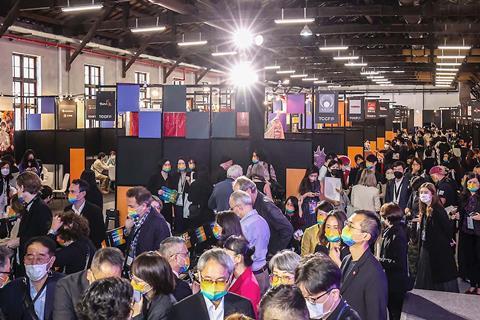Having launched in 2020, this year Taiwan Creative Content Fest is expanding with the introduction of international projects.

Taiwan Creative Content Fest (TCCF) is set to take place on a larger and more international scale this year, presenting a record 53 projects with international productions included for the first time.
Pitching projects is one of the key elements of TCCF, the content licensing and project investment market organised by Taiwan Creative Content Agency (TAICCA), running November 7-10 at Songshan Cultural and Creative Park in Taipei.
In addition to pitching, TCCF also consists of a market and an innovations platform, which enable the event to span the filmmaking ecosystem, from creation and production to distribution and marketing.
“Cultural content industries continue to rebound worldwide after the pandemic,” says TAICCA chairperson Homme Tsai. “Local and international buyers and sellers are eager to increase business opportunities at various events. This year, the market includes copyright licensing, national pavilions, film commissions and innovative technologies, with more exhibitors than previous editions. Licensing projects span from films, series, publications, animations, comics and interdisciplinary applications.”
International appeal
TCCF was launched in 2020, bringing three existing industry events into one flagship programme. It offers a platform for content development, venture capital matchmaking and an international marketplace to promote Taiwan’s content industry and talent to buyers from around the world.
The market’s duration is increased from three to four days this year and has attracted a record number of exhibitors. National pavilions are set up for the first time with France, South Korea and Japan, while TV companies and distributors making their debut include Japan’s Fuji Television, Hong Kong’s TVBI and Singapore’s Mediacorp TV.
The innovations section has the spirit of interdisciplinary co-creation at its core, with a series of showcases, exhibitions, talks and workshops about future content.
Project pitching received a record 539 submissions from 29 regions and the total cash prizes are worth more than $150,000. The 53 selected projects are divided into two categories: Project to Screen, which is open to feature films, series, animations and, for the first time, documentaries; and the new Story to Screen, which aims to introduce original Taiwanese stories with adaptation potential.
Some 43 projects are selected for the Project to Screen category. These include 10 feature projects, such as Nagi Note by Japan’s Koji Fukada and The Shadows, produced by Japanese horror maestro Takashige Ichise and directed by Taiwan’s Lingo Hsieh (The Bride, Green Door). The latter is set in the US and marks Hsieh’s first foray into the English-speaking market.
The 11 series projects include The Last Children Of Tokyo, an international co-production adapted from Yoko Tawada’s dystopian novel by Malaysian director Edmund Yeo, which Japan’s NHK is producing along with Betula Films and Flash Forward Entertainment from Taiwan. So May We Start is a coming-of-age story set against the backdrop of the Taiwanese indie-rock music scene, directed by Teng I-Hang (Fragrance Of The First Flower).
Among the 10 animated feature and series projects are Sorya, an emotional tale about a young Cambodian woman seeking freedom in the big city; the project’s French director Denis Do won the top prize at Annecy International Animation Film Festival with Funan in 2018.
The 12 projects in the new documentary feature and series session include Cannes Docs-in-Progress award winner Island Of The Winds, which chronicles a 20-year battle to save Losheng Sanatorium outside Taipei, whose residents have leprosy, and Palimpsest: Traces Of A Name by Éric Rohmer’s frequent editor Mary Stephen.
All titles in the Project to Screen category are eligible for the TCCF award: best project, valued at $30,000. There are also prizes by international sponsors such as the Motion Picture Association, Udine Far East Film Festival and Series Mania. The projects may also be qualified to apply for TAICCA’s Creative Content Development Programme and Taiwan’s International Co-funding Programme for up to $300,000 funding.
The inaugural Story to Screen category, focusing on IP stories from Taiwan, includes 10 projects and features from some of Asia’s most well-known IP holders, such as Kadokawa Taiwan, Mirror Fiction and Naver Webtoon. Three projects will receive a cash prize of $100,000 each.
The filmmaking project teams will pitch on stage in front of local and international buyers, and will be able to meet potential investors individually.















![[L-R]: Amanda Villavieja, Laia Casanovas, Yasmina Praderas](https://d1nslcd7m2225b.cloudfront.net/Pictures/274x183/6/4/1/1471641_pxl_20251224_103354743_618426_crop.jpg)









No comments yet